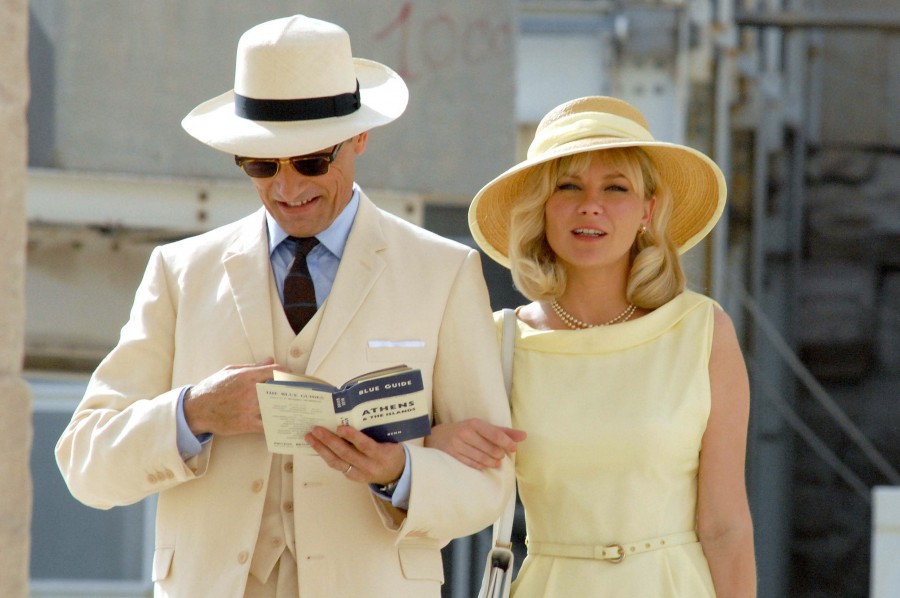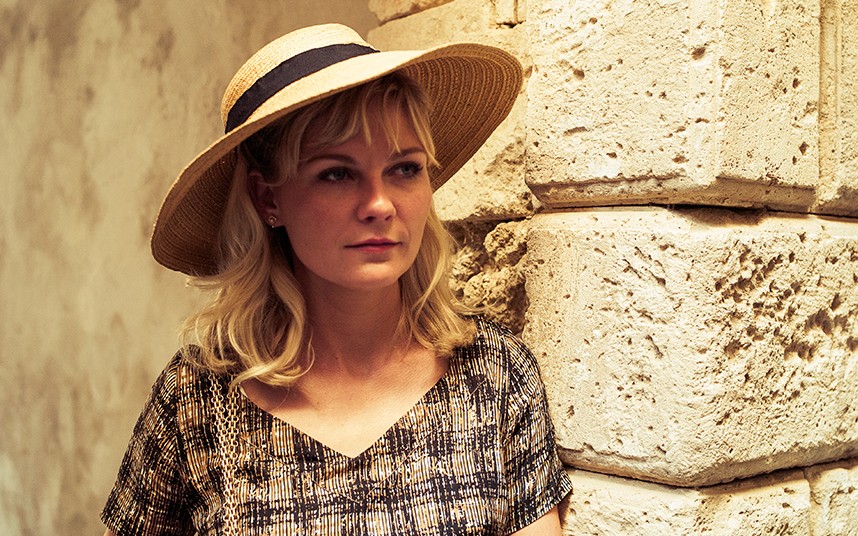 After a two-decade career as a screenwriter, resulting in an Oscar nomination for his work on 1997’s “The Wings Of A Dove,” Iranian-born Hossein Amini (“Drive”) makes a confident leap to directing with his debut feature, “The Two Faces Of January,” a psychological thriller starring Viggo Mortensen, Oscar Isaac and Kirsten Dunst.
After a two-decade career as a screenwriter, resulting in an Oscar nomination for his work on 1997’s “The Wings Of A Dove,” Iranian-born Hossein Amini (“Drive”) makes a confident leap to directing with his debut feature, “The Two Faces Of January,” a psychological thriller starring Viggo Mortensen, Oscar Isaac and Kirsten Dunst.
Based on a lesser-known novel by Patricia Highsmith, the influential crime fiction author whose previous work has seen screen adaptations by no lesser talents than Alfred Hitchock (“Strangers On A Train”) and Anthony Minghella (“The Talented Mr. Ripley”), “The Two Faces Of January” can be praised for its lush cinematography, nerve-wracking score, layered performances and tonal assuredness. And while the film lags somewhat in the second act, the thrilling climax to the ticking clock plotline adds enough intrigue to make the experience worthwhile. Box office prospects look promising in theaters and VOD for this finely etched three-hander.
 Set in 1962, “The Two Faces Of January” begins at the Acropolis where a wealthy American couple, Chester and Colette MacFarland (Viggo Mortensen and Kirsten Dunst) are in the midst of a sun-drenched Greek getaway. There, they meet Rydal (Oscar Isaac), a charismatic tour guide who makes money on the side conning naïve tourists. With their air of mystery and glamour, Rydal can’t help but notice the couple, especially Colette; and after agreeing to give them a tour of the city, they spend the day together shopping and sightseeing.
Set in 1962, “The Two Faces Of January” begins at the Acropolis where a wealthy American couple, Chester and Colette MacFarland (Viggo Mortensen and Kirsten Dunst) are in the midst of a sun-drenched Greek getaway. There, they meet Rydal (Oscar Isaac), a charismatic tour guide who makes money on the side conning naïve tourists. With their air of mystery and glamour, Rydal can’t help but notice the couple, especially Colette; and after agreeing to give them a tour of the city, they spend the day together shopping and sightseeing.
Back at the hotel later that night, Chester’s shady business dealings in the States catch up with him when he is confronted by a private eye who was hired by some dissatisfied investors looking to reclaim their losses. A fatal fight ensues and Rydal stumbles upon the aftermath when he returns to drop off a bracelet that Colette left behind. Taking Chester’s word that the detective is merely drunk, Rydal helps him move the body and, in the process, unwittingly implicates himself in the death.
Since other hotel guests saw the men moving the body, it’s only a matter of time before the authorities come knocking at their door, and Rydal sets out to help the couple escape the country safely. Having established himself in Greece for two years, Rydal uses backchannels to arrange fake passports for the couple. As the trio makes their way across the country to retrieve their passports, hiding out in picturesque villages along the way, some even darker shades to these characters are revealed, and a complicated love triangle emerges.
 Working from his own screenplay, Hossein Amini proves himself to be a natural fit in the director’s chair with this stylish thriller. Along with Danish cinematographer Marcel Zyskind (“A Mighty Heart”), Amini beautifully captures the duality of the Greek setting, with its idyllic vistas surrounded by ancient ruins, and is helped considerably by the invaluable set and costume designers, who do a stellar job bringing this period piece to life. As for the score, Amini is clearly well-versed in Hitchcock’s collaborations with Bernard Herrmann, as the music from Alberto Iglesias (“The Constant Gardener”) is similarly effective in its capacity for chills. In terms of the script, audiences may not respond well to the second act’s shift in focus to the love triangle between the characters, as it decelerates the action, but it adds some much-needed complications to the otherwise fairly straightforward plot.
Working from his own screenplay, Hossein Amini proves himself to be a natural fit in the director’s chair with this stylish thriller. Along with Danish cinematographer Marcel Zyskind (“A Mighty Heart”), Amini beautifully captures the duality of the Greek setting, with its idyllic vistas surrounded by ancient ruins, and is helped considerably by the invaluable set and costume designers, who do a stellar job bringing this period piece to life. As for the score, Amini is clearly well-versed in Hitchcock’s collaborations with Bernard Herrmann, as the music from Alberto Iglesias (“The Constant Gardener”) is similarly effective in its capacity for chills. In terms of the script, audiences may not respond well to the second act’s shift in focus to the love triangle between the characters, as it decelerates the action, but it adds some much-needed complications to the otherwise fairly straightforward plot.
Although initially the characters don’t seem particularly complex, they become more multifaceted as the story progresses and are aided greatly by the versatile acting trio of Viggo Mortensen, Oscar Isaac and Kirsten Dunst. Spending much of his screen time drowning his demons in booze, Mortensen is offered the meatiest role, with his character facing the double whammy of a crumbling marriage and a potential murder charge. Much like the character he portrayed in “A History Of Violence,” Mortensen’s Chester is hard to pin down – he’s both likeable and loathsome – and his constant unpredictability keeps the audience on their toes. Coming off the heels of his breakthrough performance in “Inside Llewyn Davis,” Oscar Isaac continues to prove his exceptional talents in front of the camera. Like Mortensen’s character, Isaac exudes charm and cunning in equal measure, and part of the film’s enjoyment stems from the audience’s constant shift in allegiance between the two leading men. And even though her character isn’t as fully developed as her male counterparts, Kirsten Dunst brings authenticity to her role as the younger wife of a conman whose Machiavellian tendencies are finally coming to the surface.
Given its enchanting Mediterranean locale, knockout performances and aesthetically pleasing nature, “The Two Faces Of January” has enough working in its favor to justify the price of admission.
By Lucas Mirabella
Running Time: 96 minutes
Rated PG-13 for some violence, language and smoking.














